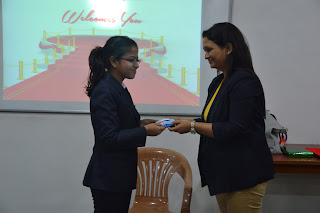Ms.
Meghna Girohtra, Director – Strategy, Reliance Entertainment, was able to
relate well with 60 students of PGDM-III, 1st Year, Batch 2015-17,
on Friday, 1st April 2016 in Classroom 304, 3rd Floor, on
the topic, ‘Managing mobility-Campus to corporate transition’. Ms. Meghna
Girohtra had a congenial session with the 1st Year PGDM students.
Being an alumnus from the Digital Marketing Media Industry, she addressed
student concerns primarily in this area. She explained the numerous
opportunities available to students in this domain. She discussed how to
communicate in the corporate world, with humorous anecdotes interspersed in the
lecture. The role of email and mobile etiquettes were given with illustrious
examples. Students raised questions and she in turn asked those queries and
helped them walk through the corporate life as she once embarked upon herself.
Ms. Jyotsna Munshi felicitating Ms. Meghna, Director; Strategy, Reliance Entertainment
Ms. Meghna with students raising their hand to answer to the important nuances in Mobility from 'Campus-to-Corporate'
The
HR Club Matrix students were honored with Ms. Meghna presenting them with
mementoes for their outstanding contribution to HR Matrix Club at its various
events.
Ms. Payal receiving from Ms. Meghna a token of appreciation for her invaluable contribution in organising various HR Club Matrix activities
Mr. Rohit being awarded by Ms. Meghna for his excellent 'Backstage Coordination'
Mr. Bhavin accepting the honour for organising HR Oratorio and other HR Club Matrix events
On the whole, the session was a good two-way interchange of knowledge.




















